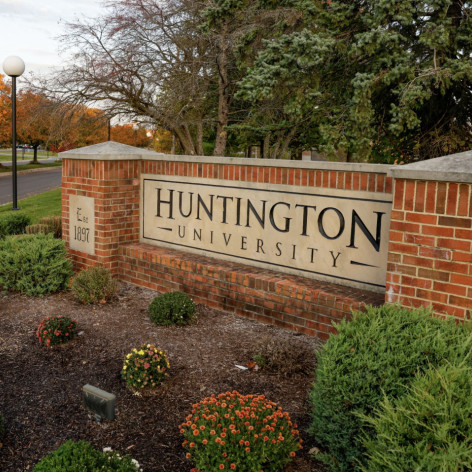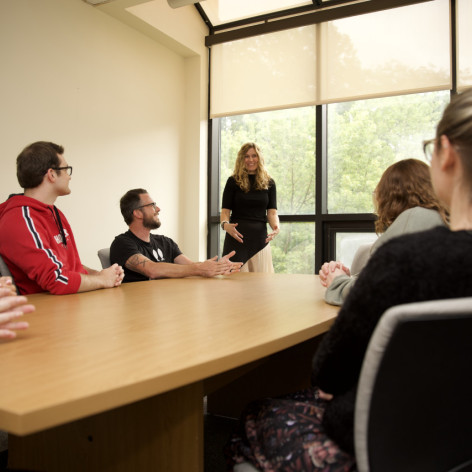HC Music Department is accredited by NASM
FOR RELEASE: Friday, August 10, 2001
Huntington, Ind. "The Department of Music at Huntington College has been accredited by the National Association of Schools of Music[i], a giant step forward in expanding the HC program's enrollment and national reputation. NASM is an organization of schools, colleges and universities that offer music studies. Founded in 1924, it has 578 member institutions and has established a threshold of standards for undergraduate and graduate degrees.
Click to download high-resolution image.
NASM accreditation affirms the quality of HC's music curriculum and presents new opportunities for music graduates.
While Huntington College as a whole has been accredited by the North Central Association of Colleges and Schools[ii] since 1961, this additional accreditation of the Music Department is seen as a national seal of approval that ensures the HC curriculum is on par with the most reputable programs in the country. In a similar way, the Huntington College Department of Education is additionally accredited by the National Council for Accreditation of Teacher Education (NCATE)[iii]. (Click here for details on HC accreditations and memberships.)
This is a wonderful achievement and something for us to be very proud of, said Dr. Ronald Webb, vice president and dean of the college.
NASM accreditation affects both current and prospective students in a significant way, said Dr. Janice Fulbright, music department chair. Our graduates will be able to get into graduate schools much easier, said Fulbright. Being accredited with NASM means our curriculum is on the same level as any other accredited school's. Fulbright adds that NASM accreditation will help attract prospective students and foster Huntington College's continued enrollment growth.
The achievement has been many years in the making, with extra effort being devoted by the entire music faculty over the last two years. The hope of becoming a NASM-accredited program originated with Dr. Marlene Schleiffer, director of instrumental studies and musicology, when she cam to HC 27 years ago, and continued with Dr. Patricia Spedden, director of piano studies and theory, when she joined the faculty 16 years ago. At that time, the music department did not have enough majors to qualify for NASM. Recent growth, however, has made the goal attainable. Huntington College as a whole has increased in enrollment 58% since 1993.
Dr. Spedden began work on the initial NASM application in 1998. The 120-page document, which cataloged every aspect of the music department, was submitted in the spring of 1999. In June of that year, the faculty received word that the department had been deferred for one year, meaning it was not rejected, but still had some revisions to make before being accepted. So, when Fulbright was appointed department chair in July 1999, she immediately began to work on NASM's suggested revisions.
We completely rewrote the curriculum this past year, Fulbright said. It was a huge undertaking, but in doing so we were able to incorporate all of the specific things that are required by NASM.
Some changes to the curriculum and general program included:
Familiarizing students with all five major teaching methodologies of music education
Requiring a minimum competency on every orchestral instrument, even for choral majors.
Requiring a minimum competency on guitar for teaching in the classroom.
Additions of books, CDs and scores to the department library.
Additions to the department's stable of orchestral instruments.
Requiring basic jazz improvisation and composition and arranging in every degree program.
Supervision of music student-teachers by music faculty.
Additions of computers and other technological equipment and music software.
Acquiring additional faculty in guitar and voice.
Fulbright turned in the revisions in April, 2000, and when the review committee met in June, Huntington College was accepted as an Associate Member of NASM and listed in the organization's national directory. After five years, a NASM visitation team will return to Huntington College. The department will then be eligible to become a full member, with reviews every 10 years.
Fulbright says NASM accreditation will help Huntington alumni advance to the top graduate programs in the country. "Graduate school competition is very tough," said Fulbright. "It gets to the point where music admissions counselors will put the applications from people in NASM schools in one stack and the ones from other schools in another stack. Graduate students from colleges lacking NASM accreditation are often placed in remedial classes to ensure they have the necessary preliminary training. Fulbright said Huntington College graduates will face no such impediment.
NASM accreditation is expected boost enrollment. The Music Department currently has approximately 40 majors and minors. Fulbright expects word of the NASM accreditation will take a year or two to spread to prospective students and their parents, but she believes by 2005, the department's enrollment could triple.
For a small school like Huntington that doesn't yet have a national reputation for music, it's very hard for us to sell our program to parents who are looking for exactly the right place for their talented student," Fulbright said. "In the field of music, if you're not a NASM school, you're not given serious consideration because you have no standard to meet or uphold.
This gives us a national seal of approval that means our curriculum is just as good as any other school's. There's just no way to go but up.
--------------------------------------------------------------------------------
[i] National Association of Schools of Music, 11250 Roger Bacon Drive, Suite 21, Reston, VA 20190, (703) 437-0700
[ii] North Central Association of Colleges and Schools, Commission on Institutions of Higher Education, 30 North LaSalle Street, Suite 2400, Chicago, IL 60602, (800) 621-7440
[iii] National Council for Accreditation of Teacher Education, 2010 Massachusetts Avenue, NW, Suite 200 Washington, DC 20036-1023, (202) 466-7496



